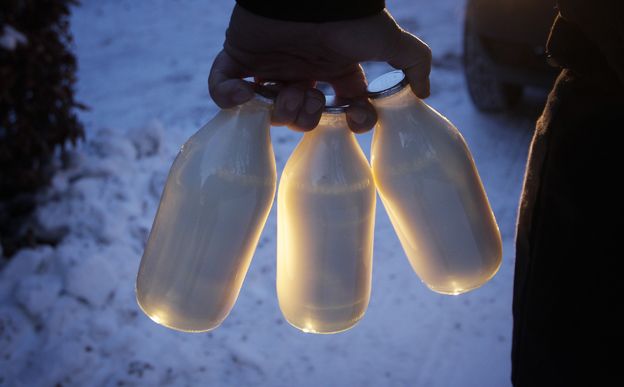Tesco and Carrefour to trial refillable container scheme
Toothpaste tablets instead of tubes, ice cream in aluminium tubs and body lotion in glass bottles could be what we're all buying in future if a new environmental scheme succeeds.
Tesco and French supermarket Carrefour will trial a new, global online shopping service based on refillable rather than recyclable containers.
Empty product containers are collected, cleaned and refilled for reuse.
If successful, the firms say the scheme could mean lower prices for shoppers.
The system will first be trialled in Paris by Carrefour in the spring, as well as in a separate trial in the US and subsequently by Tesco later in the year.
Unveiled at the World Economic Forum in Davos, initially a limited number of items such as toiletries, ice-cream and breakfast cereals will be available to testers who sign up to the trial.
Testing of the scheme - called Loop - is gradually expected to expand globally. If successful, the number of products available will also increase and eventually be stocked in stores.
Typically, shoppers will pay a small deposit for a product's container which will be refunded when it's returned.
While the idea of refillable vessels hardly seems revolutionary, until now the environmental focus has largely been on trying to make sure materials are recyclable rather than reusable.
"It's a good thing to recycle, but now the idea is to eliminate unnecessary waste before it happens," said Carrefour general secretary Laurent Vallée.
The supermarket chain already allows shoppers to bring their own refillable containers for a limited range of products such as rice and pasta in some of its French stores.
But Mr Vallée said the new online scheme would offer a wider range of products and be easier for customers to use.
"It's the old-fashioned deposit system in the 21st Century," he says.

Refilling became a 'huge habit'
 Melissa Spur
Melissa SpurMelissa Spurr, a 32-year-old lawyer living in New Jersey took part in a six-month long initial trial. As someone who is already environmentally conscious she was an easy convert.
The limited product selection was too small to "revolutionise" her shopping, but she says that ordering and refilling quickly became a "huge habit".
She ordered various dry goods including crackers and granola through the scheme as well as shampoos and toiletries.
"I still had to do grocery shopping because there were no vegetables," she says.
The scheme's convenience meant she would shop in this way if it became available permanently, she says.

Greater convenience
Currently, refillable schemes tend to be in niche health food chains or smaller supermarkets such as US chain Whole Foods. Last year, UK supermarket Morrisons became the first of the big four chains in the UK to allow shoppers to bring their own containers for fish or meat from their specialist counters.
Previous trials have not been successful. For example, in 2011 Asda decided against expanding a small trial of refillable fabric conditioner bottles after shoppers failed to keep reusing the containers.
But Tom Szaky, the chief executive of TerraCycle, the recycling firm that has created the scheme, said it had done two years of consumer research before deciding to launch it.
He said convenience was the biggest attraction for shoppers, with them being able to set up a regular subscription for refills. But he said its research showed people also preferred the design of the more durable vessels with the environmental aspect of eliminating waste the third-most appealing aspect.
Mr Szaky admitted there was little new in the idea of refillable vessels, describing it as a modern take on the milkman, offering a much broader range of products.
"What Loop challenges is ownership. 99% of what we buy we throw out after just one use. Why own something when we only want the content?," he asks.
 Getty Images
Getty ImagesConsumer goods firms including Procter & Gamble, Unilever, Nestle, PepsiCo, The Body Shop and Mondelez are all contributing products for the trial.
Unilever's chief research & development officer David Blanchard said it was a large-scale experiment to see if the "reuse, refill model can actually work".
He said they would need to see "sustained behaviour change over time" to know if the trial had succeeded.
"What will determine success is the repeat rate [of purchases]",
The test will also include the collection and recycling of some items - including nappies, toothbrush heads, tampons and razor blades - that are normally thrown away.
Virginie Helias, vice president of global sustainability at Procter & Gamble, said the environmental benefit was dependent on people reusing the containers.
"If people don't adopt that new behaviour it won't work," she said.
But she said initial, small-scale tests were "extremely encouraging".
